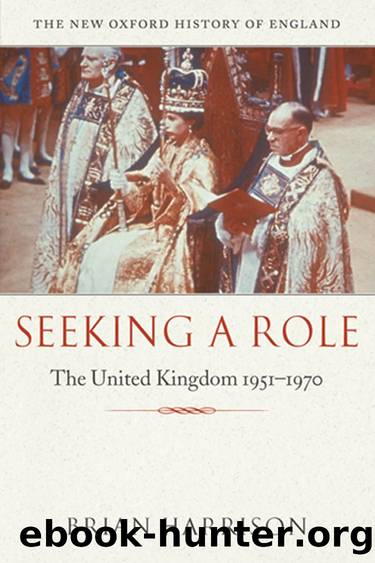Seeking a Role by Harrison Brian;

Author:Harrison, Brian;
Language: eng
Format: epub
Publisher: Oxford University Press, Incorporated
Published: 2009-06-14T16:00:00+00:00
4. AESTHETIC CORNUCOPIA
Fast–growing universities helped to fill the cornucopia of cultural opportunity that enriched British life from the 1950s. University Bookshops, Oxford (UBO) and other consortia set up or nourished high–quality bookshops in university towns.149 Thirty new theatres were built in the 1960s,150 usually with their companies supported by local authorities or centrally funded through the Arts Council. The anti–vocationalism of British higher education had traditionally identified the performing arts with ‘trade’, assigning them (in contrast to the USA) to an extra–curricular role, but this did not prevent the universities from culturally leavening their localities. Intermediaries sprang up to interpret the university to society and society to the university, most notably Richard Hoggart and Raymond Williams, but the growth of academic professionalism and the decline of a leisured class with a private income combined after 1951 to make the ‘man of letters’ seem unfashionably amateur. The Harold Nicolsons, Philip Toynbees, and Cyril Connollys could survive for a time as broadcasters on the Third Programme and as literary critics in weeklies or Sundays like the New Statesman and the Observer, but the integrated and educated elite that had once spread out from country house to subscription library, from country rectory to London club and London Library, was now fragmenting and fading.
Hence the widespread concern in the 1950s about whether ‘popular culture’ would fill the gap. University teachers in English literature, especially when influenced by the Cambridge academic F. R. Leavis, showed a growing part–time interest in producing and reviewing fiction, as was advertised when reviewers in the Times Literary Supplement lost their anonymity in 1974.151 Peter Hall claimed that Leavis, despite disliking the theatre, wielded even there ‘more influence … than any other critic’. Creative writers did not always welcome Leavis’s pronouncements. When he declared D. H. Lawrence alone worth consideration among modern novelists, J. B. Priestley expressed alarm at this ‘sort of Calvinist theologian of contemporary culture’ with his acolytes forcing authors ‘to undergo some kind of customs and passport examination … with narrowed gaze, tight lips, service revolvers’.152 Larkin regretted that academic professionalism had since the 1920s called forth the kind of poetry that required elucidating: for him, twentieth–century English poetry had ‘gone off on a loop–line that took it away from the general reader’. He rejected the modernist view that Betjeman was commonplace and old–fashioned because instantly intelligible: there were all too few Betjemans and Dylan Thomases to hold poetry and the general public together.153 So successful were Betjeman’s Collected Poems (1958) that by February 1960 ‘this awful publicity’ was ‘getting me down’.154
Professionalism was also spreading through publishing, where a quiet revolution occurred between 1951 and 1970. The history of firms such as Faber and the Hogarth Press illustrates how blurred had been the interwar boundary between author and publisher, an attractively amateur affinity which persisted well into the 1950s. Authors and publishers did not qualify as professionals because they lacked the professional person’s exclusive entry, formal qualifications, and standardized career pattern. Yet neither were they committed entrepreneurs:
Download
This site does not store any files on its server. We only index and link to content provided by other sites. Please contact the content providers to delete copyright contents if any and email us, we'll remove relevant links or contents immediately.
| Africa | Americas |
| Arctic & Antarctica | Asia |
| Australia & Oceania | Europe |
| Middle East | Russia |
| United States | World |
| Ancient Civilizations | Military |
| Historical Study & Educational Resources |
Elizabeth by Philippa Jones(2043)
Mary Boleyn by Alison Weir(1724)
Traitors of the Tower by Alison Weir(1499)
A Journal of the Plague Year (Oxford World's Classics) by Daniel Defoe(1424)
Notes From a Small Island by Bill Bryson(1262)
A Short History of England by Simon Jenkins(1210)
Eleanor of Aquitaine by Marion Meade(1183)
Moon Tiger by Penelope Lively(1180)
Queen Isabella by Alison Weir(1169)
Life of Pi by Yann Martel(1166)
The Real Middle Earth by Brian Bates(1161)
London Under by Peter Ackroyd(1143)
American Idol by Richard Rushfield(1033)
Tudors Versus Stewarts by Linda Porter(1010)
Her Majesty's Spymaster by Stephen Budiansky(1006)
Albion by Peter Ackroyd(973)
The Creation of Anne Boleyn by Susan Bordo(961)
Cromwell, Our Chief Of Men by Fraser Antonia(932)
Children Of England: The Heirs of King Henry VIII 1547-1558 by Weir Alison(904)
